White Pony Turns 20: Musicians, Actors Pay Tribute to Deftones’ Dream-Metal Classic

Blame timing. Almost a year to the day after Korn’s self-titled debut landed on record store shelves, the Madonna-discovered Deftones issued their maiden studio set, Adrenaline, on the Material Girl’s Maverick Records label. Critics lumped the Sacramento-based avant-metal quartet in with the tracksuit-sporting boys from Bakersfield — which, in retrospect, was sort of like comparing the Spin Doctors to Radiohead.
While Korn’s music has always deservedly been tagged nü-metal, Deftones did what they could to distance themselves from it. It would soon become clear that Deftones were something else entirely: bold, experimental, often spellbinding, and rarely consistent with the trendy trappings of nü-metal.
Click here to read the full article on SPIN.
More from SPIN:
On June 20, 2000, with their peers rapidly losing relevance, Deftones unleashed their third and most daring studio album, and finally distinguished themselves from the scratch-happy malcontents they had been affiliated with. The late Chi Cheng’s pulsing bass lines, Abe Cunningham’s complex, punchy drumming, Stephen Carpenter’s driving dissonance, and the subtle, indispensable contributions of keyboardist and turntablist Frank Delgado all contribute to the atmosphere that the alternately sultry and sinister Chino Moreno thrives in. Many believe that White Pony is one of the most important releases of the last 20 years, and it’s not hard to see why.
With an appearance from the late Scott Weiland on the dark, hypnotic ballad “℞ Queen,” a chills-inducing duet with Tool’s Maynard James Keenan in “Passenger,” and the haunting wails of late actress Rodleen Getsic on “Knife Prty,” White Pony is a moody masterpiece that brought unexpected collaborators into the Deftones’ unique world, and more fans than ever before. Longtime admirers were stunned and delighted with risks like the ambient R&B of “Digital Bath” and the trip-hoppy “Teenager,” that reflected that their fixation with, say, covering Sade’s “No Ordinary Love,” was not a joke. This is the LP that would come to define them, cemented by their most recognizable radio hit, the downright creepy “Change (In the House of Flies).”
To commemorate White Pony’s 20th anniversary, SPIN reached out to several well-known Deftones devotees and friends of the band for their insight and perspective on how pivotal White Pony has been to the heavy music that would follow.
Mike Shinoda
Vocalist and guitarist (Linkin Park)

Credit: Frank Maddocks
I heard the first album, Adrenaline, from a friend when I was in high school; he bought the CD. I liked that album, but I liked Around the Fur even more. I think everyone who was following what the band was doing was really excited to see what would come next. Deftones just has such a unique sound and aesthetic, and White Pony was the album that took such a big step up in terms of communicating who the band was.
Chino’s sense of eerie and unconventional melody, the band’s technical chops, and the engineering and production all felt really innovative and fresh when it came together. Nobody was making anything that sounded like that, and when people did, you could tell they were inspired by Deftones.
We wouldn’t have written a song like “A Place for My Head” if not for them. There was a bounce to their music that reminded me of my favorite hip-hop songs. And even though the guitars were super heavy, oftentimes they felt smooth like a keyboard, as if the distortion had flattened it so much it was just a wash of chords.
White Pony was one of the few albums I was into where I barely knew any of the words. They felt like estimations of lyrics, to me — really abstract and intuitive. I probably still think some of the lyrics say things they don’t say. But isn’t that the beauty of music? A listener’s experience with it can be such an integral part of the song, that it takes over the song’s actual intention or meaning.
Colin Hanks
Actor/director (Orange County, Dexter)

Credit: Sam Jones
As a Sacramento kid, who grew up there, I had played in a band in high school and I would sort of hang around a lot of the music shops and stuff. There was this one particular music shop that I hung out at that was close to where I lived, and Chris [Robyn], the drummer for Far, he worked there, and so he was sort of one of the guys I talked to a lot about what was going on in Sacramento at the time, as well as just pretty much anyone else I knew who was sort of involved in music or big in the scene there. So, Deftones, they were the band that everyone felt like, “Oh, it’s definitely going to happen for them.” There was a feeling around them that, yeah, they’re going to go forward and represent Sacramento and what was going on at the time. Then they got signed to Maverick, which was just an unknown label that was just starting out. There was definitely this movement behind them early on, so by the time Adrenaline came out, it was like, “Yes, okay, they’re going out and sort of gonna be a thing.” And then, by the time White Pony comes out, it’s kind of mind-boggling, the leap that they made.
I’m consistently amazed at how much they have grown and evolved and really truly become real artists. The irony is, they always were. But when you’re young and music is the most important thing to you, you’re not necessarily thinking about it those terms. With White Pony, I was like, “Oh, this is possible now.” And there were a lot of bands that were dabbling in that similar sort of vein, adding synths and sounds and all that sort of stuff. None of that was necessarily new, but I did feel that the combination of that sort of — whatever you wanna call it: industrial, hardcore … there were so many different words being thrown around at that time. The fact that they were able to take all of that and combine it with a sound that was very definitively theirs, it was amazing.
Their sound was fucking huge and massive, but it almost had this lo-fi component to it, and it felt that way on their first record. They were doing something sonically that was very, very different from anything else anyone was doing. I think Far was kind of like that, to a degree. By the time they get to White Pony, there are those other bands, adding those additional sounds, but there was just something about what I like to call that lo-fi metal thing Deftones were doing that was grainier. I could feel it more, because it wasn’t so polished, and obviously the vocals are certainly some of the most unique in music. There’s atmospheric levels to it, and then it comes from a passion as opposed to just some sort of guttural noise.
They really let out a much more artistic and almost feminine quality to what it was they were doing, which automatically made it different from everybody else. Chino, the way he would harmonize and the way that his vocals were laid into all of this huge canyon of music. The way his vocals came down and existed within all that was so different from all of that other stuff that it really set it apart in its own section of the sandbox.
Derek E. Miller
Guitarist (Sleigh Bells, Poison the Well)

Credit: Sloan Laurits
I was a massive Deftones fan. Adrenaline came out when I was 13 or 14, immediately became my favorite record, and they became my favorite band. I saw them in the April of ‘96, and, you know, a lot of people who end up making records, either for a living or just obsessively, they have one of those transformative moments or experiences in their life, and when I left that show, I knew that I was going to make records forever or die trying. They changed my life right off the bat.
They didn’t create that “heavy/soft” sound in rock, but nobody really put it all together quite like Deftones did, and do still, of course. Just the lush, the harsh… the dynamics on White Pony were incredible. It was really melancholy, dissonant, and beautiful. For me, White Pony is the moment they went from being a really great heavy band to being just a great band, period. It makes them legends in my book. The way they string together these disparate elements is uniquely Deftones — really dissonant, full of blue notes. It’s never sentimental, and always a bit menacing. I still listen to it to this day. “Knife Prty,” for my money, is one of the top three songs in the Deftones catalog. They still spit out incredible tracks; every album has at least a handful of jams that go into rotation.
Poison the Well spent a month opening for them in 2003. At that point, it was one of the most incredible experiences of my life. I didn’t miss one of their sets. One of the other bands on the tour was Denali, and I had a huge crush on the singer coming into the tour, Maura Davis. We ended up dating on that tour, and would watch the set together almost every night, and I remember thinking there’s no way life’s gonna get any better than that. I was 20 or 21, so, I’ve obviously had a lot of incredible experiences since then, but it felt like the top of the mountain.
Murs
Rapper
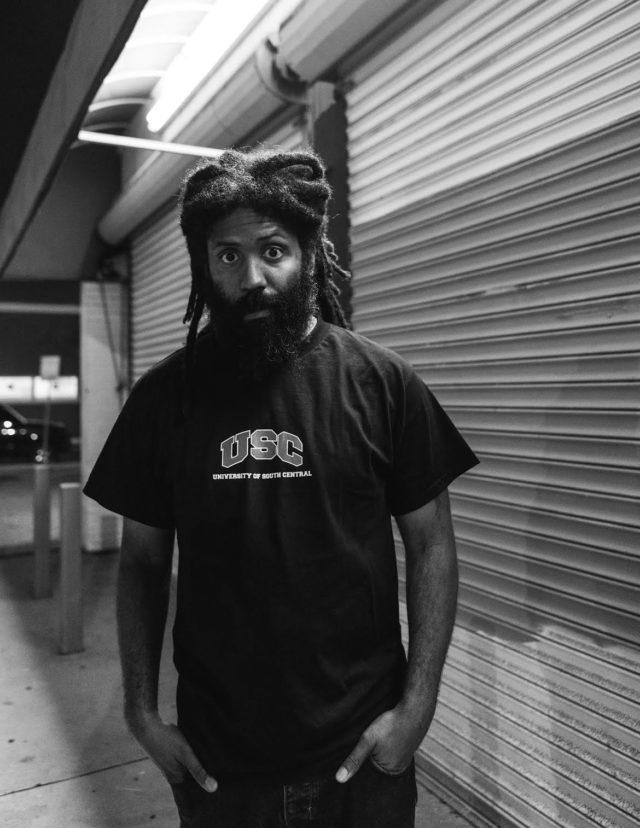
Credit: Edgar "Macksimo" Medina
White Pony wasn’t something I was looking for. I was broadsided. I just happened to be working at Zia Record Exchange in Tucson, Arizona, in 2000, and I took the job because I was re-opening a record store that my friend had downtown, and I was doing research, to see what to stock my store with. One of the kids I worked with, he would play White Pony every day, and as soon as it would come in used, it would fly out. So, I was like, “What is this?” And man, I had never heard music liked that — straight up. My experience is very urban, as they would say — a very black American experience: My parents were into R&B and hip-hop. Not even really jazz. Chino’s voice, man, and the music … I fell in love, man.
That album, just from the beginning … it’s the music, it’s the voice, even the album cover. I don’t know who these people are, I don’t know what they look like. That had me looking in Kerrang! and all these strange metal publications, trying to find out, “Who is this?” To this day, I buy every Deftones record. I don’t care. I’m aware of metal, I’m aware of Slayer and Metallica, and Black Sabbath. I know they exist, but, I’m a fan of Deftones. Their music just aligns with my soul, and especially that album. It’s a classic… I would say top 10, at least, any genre of the past 50 years.
I love “Elite,” “Knife Prty,” “Teenager.” I think the next three or four records were great, but there’s something about White Pony. I heard something, and I found myself going home from work, singing it, so I finally asked the dude I worked with, “Who is this band?” “Oh, that’s the Deftones.” “Cool. I need to buy it.” I have bought that album I don’t know how many times. When I saw them live, I was skeptical, because I was like, “Can he sound like that?” Like, how does your voice go from so beautiful to so harsh. There are no effects, no pedals … you are doing this for months out of the year. He also doesn’t look like a frontman. You look at him, and it’s like, “How the fuck did that come out of that guy?” He’s amazing, and the music just accompanies it.
White Pony is the genesis, it set it off for a kid who, to this day, I don’t think I have another musical experience like that where, something from another genre grabbed hold of me. White Pony literally spoke to my soul.
Titus Welliver
Actor (Bosch, Deadwood)
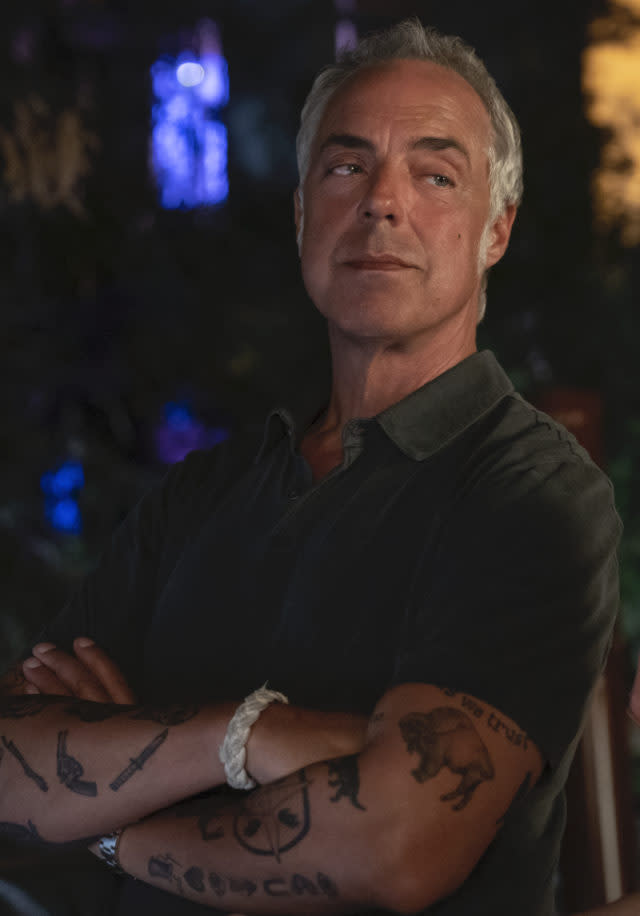
Credit: Amazon
I was at a party a thousand centuries ago and heard a couple of cuts. I can’t remember which album it was. So, Deftones were always sort of on my radar. And then, I was with my sons and my daughter, and my eldest son, Eamonn, was cranking them, and I came into his room and I went, “Jesus, this is so good. Who is this?” And he said, “Oh, Dad, it’s the Deftones.” And I said, “Just keep that going,” and went down the rabbit hole.
He had an encyclopedic knowledge of the Deftones, and he’s really responsible for educating me. We were listening to White Pony and the rarities album, which is how I got hip to the sort of soft, acoustic version of “Be Quiet and Drive (Far Away)” and I remember the first time he played it for me, I was fucking stunned. The hair on my arms and on the back of neck was standing up, and I went, this is so cinematic, and such kind of a crazy departure for them — and I love Chino’s voice. It’s the quintessential rock-and-roll voice, and, like Richard Patrick of Filter, he has this ability — because he has such a beautiful voice, but also to punch it out and be raw and hard — his vocal range is stunning.
That song ended up on a loop on my phone. I found I kept replaying it and replaying it, and eventually, came up with the opportunity to use the song on [the season 5 finale of Bosch] and there was no resistance. I remember sending it to [novelist and Bosch creator] Michael Connelly and [Bosch producer] Henrik Bastin, two of our executive producers, and they had the same kind of visceral response to it: “Who is this band?” Michael loves music, as does Henrik, but I don’t think Deftones is in his wheelhouse, and he loved it.
I’ve got tickets to see the ‘Tones at the Greek Theater in L.A. in August. They haven’t issued refunds because they are planning to eventually do it. But the anticipation and excitement of going to see them, particularly at the Greek, which is a smaller venue. I was like, forget it — all the wildlife will be falling out of the trees when they hit the first fucking chord. I’m sort of almost oddly schizophrenic in my musical leanings, but the Deftones, for me to tattoo that white pony image on my arm is significant in my connection and love of the band.
Brann Dailor
Drummer (Mastodon)
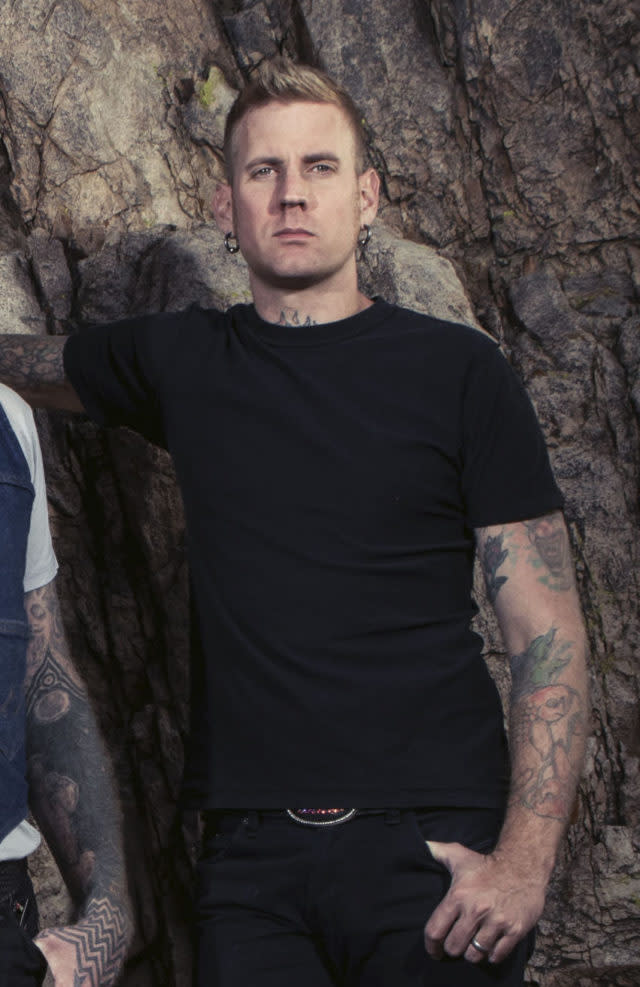
Credit: Jimmy Hubbard
White Pony is the crown jewel in the Deftones’ discography. I love all their albums, and I was a latecomer to Deftones — not super late. Around the Fur is when I was like, “Okay, I like it.” For some reason, before that, I wrote them off. And I have told them this. I thought they were some Korn derivative because there were so many of those bands around that time period, when Adrenaline came out. I was like, “It’s not for me. That’s not what I’m into.” I remember I was at my guitarist’s house for a party, and I’d gotten a little bit stoned, and I was sitting up in his bedroom, and Around the Fur came on — it was super loud — and I was just like, “Who is this?” It was just perfect. My friend Eric came in, and I was like, “Dude, who is this?” And he’s like, “It’s the Deftones,” and I go, “Fuck! I have to put my foot in my mouth,” you know what I mean.
At the core of White Pony, you have all this experimentation and you have all this cool instrumentation and just different stuff that they were trying, which is awesome. But there’s this real deep, emotional heart to the record that I think really makes it stand out, above anything else. All that other stuff is great, but I think the melodies, the hooks, the subject matter to some of the songs … I don’t know, there’s just something about it. What makes an album great is having that emotional core and the ability to be evocative in that way.
I felt that Abe’s drumming was very original. I have emulated it where I feel like it serves it, and think about him. We’re close friends, you know, so, I love that dude, and I really appreciate his playing. I think it’s very original, very him… he’s one of those players were, you can tell that it’s him right off the bat. Some of that stuff is polyrhythmic, and you can tell he’s thinking about it. As a drummer, if you listen to what is being fed to him, guitar-wise, you can hear what a common beat would be to that. Then you hear what Abe plays, which is going to be different. It might still get your head moving in the same direction as the simple beat that would be there normally, but it’s just that much more interesting. He doesn’t ever sacrifice that groove, because that’s one of the most important things for the Deftones, to maintain that pocketed groove that Abe does so well, and just really kind of keep it a little dance-y. You want people to dance but you also want to be artistic, and it’s a fine line.
White Pony is pristine, start to finish. It’s just a beautiful piece of art. It wowed everybody. You hear Around the Fur, and you don’t know what they have inside of them. They don’t know, and then White Pony comes out and it’s like, “Oh, shit!” It’s an album that’s celebrated across the board. It was a very big moment for rock music.
Walter Schreifels
Singer (Quicksand)

Credit: Cecilia Alejandra
If you look at the evolution of Deftones, it is that perfect arc where, a band comes out, is exciting, and then, is able to follow it up, reinforcing what you first liked about them, but improving the formula, so to speak, and dialing it in. And then, the third album being the culmination of the creative aspects of the band, but they also take chances. They’re able to maintain that initial spark that they came up with but project onto the future a new sound. As the Deftones were coming up, they got grouped in with the nü-metal scene. But, that whole moment, when that stuff was just getting played on MTV, I think with White Pony, it came out when that moment was sort of passing or was getting so popular, it was no longer upcoming, but it was there. Instead of just, like, delivering some big commercial single, Deftones instead did something kind of musically interesting that has a more timeless quality.
I can remember Korn having these huge hits at that time, that maybe eluded Deftones. But after White Pony, people began comparing them to Radiohead. No one was comparing Korn to Radiohead — and that doesn’t mean that’s the standard of being a good band or a bad band. However, it puts you in a realm where, okay, maybe you won’t be can’t-walk-down-the-street famous, but you ensure a long career, because people are interested in you not only because you make them feel something but you’re an artist, and the context of an artist goes on, as long as that artist is true to their art.
I think Deftones, with White Pony, solidified their legacy right there and then for those first three records. Again, it is a Radiohead comparison: Radiohead put out their first record, they got the people’s attention, and that second record was awesome, but the third one was expansive and blew people’s minds. Ever since then, it doesn’t matter what they do. They have that respect and that integrity, and that is a rare commodity in music, more so than commercial popular acceptance. Not that they’re not popular, because they are, but … you know what I mean.
For Deftones, it’s not a failure if they don’t come out with a Top 5 single — it’s about the band, the culture that came up with them, and the fact that new kids, if they’re interested in heavy music, have to deal with them. If you are going to learn to play guitar, at some point, you’re gonna gave to deal with Deftones, and see what they’re all about, because they’re just there. You have to give them that respect.
Around the Fur was the first time I got into them, just because of the sheer aggression of it. White Pony, the guitars are so heavy, but there’s no guitar solos and you don’t get ear fatigue from the guitars. There’s a warmth and kind of a landscape, and the way that it ties in with Abe’s drumming. Abe is so lyrical, you could just listen to the drum track, and there’s a song within the drum track. You could follow it as a story, because Abe is never clinging to a set pattern. He’s never cruising, he’s always pushing and putting his passion into it. That’s hard to do with a record that sounds so smooth and cool. And Chi, a lot of times, is backing up what Stef is doing with the riffs, but when he pulls apart from what Stef is doing, it just creates so much dimension.
A cool thing with White Pony is how, in that era, there were these other nü-metal bands where there was a DJ with a turntable or something, but Frank — they didn’t go that way. Frank’s subtle background pads are such a secret to the success of Deftones. And Chino is basically a force of nature on that record. He can sing in this sexy voice but then go full psycho, and can shift gears at any moment. You are constantly engaged in his vocal, and, ultimately, there is no weak link in the chain with that band — especially on White Pony.
Jonah Matranga
Singer (onelinedrawing, Far, New End Original, Gratitude)
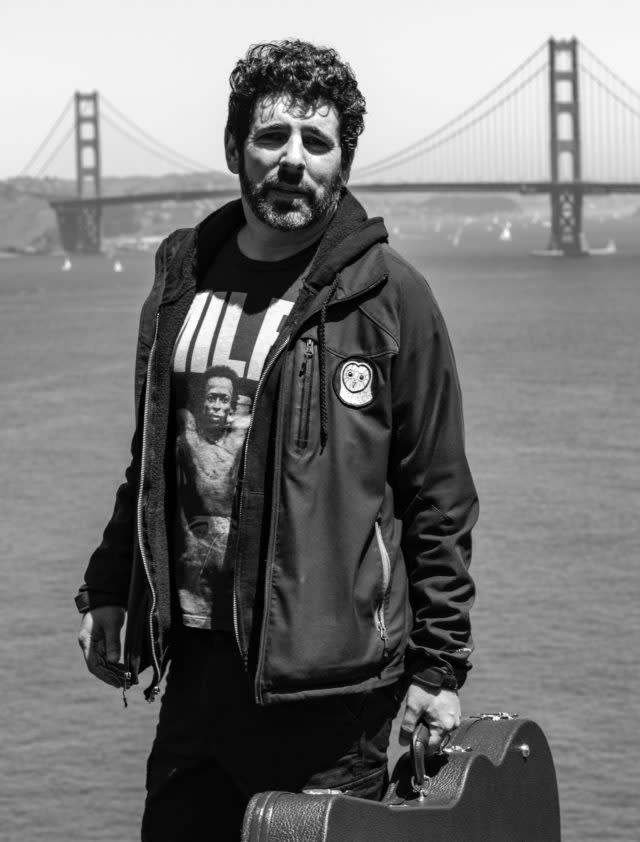
Credit: Phill Mamula
White Pony, like [Far’s 1998 debut LP] Water and Solutions, I think, is something that has really aged well, and doesn’t sound like something of that era. I think there’s other stuff by Deftones and other bands that has not aged well, even if it was pretty badass then. When it came to the Deftones, I was always protective of them, because I saw a band coming up, and obviously we came from the same place, though they inhabited a more aggressive, dreadlocked, Adidas kind of vibe than [Far] did, because we weren’t that. But, I knew them, and I saw these amazing songs, and the way they worked and the way they played, and I would see these bands taking the Whitesnake-Led Zeppelin route—like, taking these very superficial elements of Deftones, and blowing them up into these horrifying caricatures, whether that’s Korn or Limp Bizkit or Coal Chamber. I was just defensive of Deftones, because these bands were cheapening what was a potentially interesting thing, and thankfully, the Deftones didn’t get lost in that same stereotype because they kept working, and I think White Pony is their most important record, on the level that it, like, let them graduate from that scene, which I’m very happy about.
For me, the perfect track on White Pony is “Digital Bath.” That’s the perfect future-thinking, genre-destroying piece that just transcends everything. “Change (In the House of Flies)” is an interesting tune, too, and is sort of a neat little Deftones template, in a lot of ways. Certainly, for everything that came afterward. They definitely let out influences that I was hearing all the time, kind of growing up with them, and I was pretty psyched to hear them putting those on a record.
Chino sent me some White Pony instrumentals before they were formed, because he was looking for help on vocals and seeing if I wanted to do anything, and I liked it, it was cool to hear, but honestly, I didn’t get it. I had some ideas for “Change (In the House of Flies),” and we went into the studio. I don’t think any of my ideas made it in there, melodically, and I had a hard time wrapping my head around it. When the record came out, Chino was really able to pull those tunes together in an incredible way, and finally I heard what they were going for in those instrumental tracks. It kind of blew my mind. We grew up together, and I love all of them — they’re family forever. Chino’s just a really wonderful singer and lyricist, and just a creative creature. He’s awesome.
It was really the record on which Chino started playing more guitar, which is kind of an interesting role change. That’s something that always struck me, too; I was happy to see Chino’s sort of sweeter, croon-y side let out to play a little bit more, and I think that’s when they settled into the identity that has really become them now. They have not really left that arena since they entered it. Deftones and White Pony have been a big part of my life.
Fandango
Wrestler (WWE)

Credit: Courtesy of WWE
I grew up a skateboarder up here in Maine, and I was straight edge for a while. I was really into Victory Records and Revelation Records – Earth Crisis, that hardcore stuff. I was into bands like Scissorfight, Death Before Dishonor, Civ, Gorilla Biscuits. They would do live music at this skate warehouse called the Zone, and I remember them doing Deftones covers. I remember asking my buddies, “What’s this band?” And we would trade CDs at that time, and I just kind of fell into it and started liking it. Around the Fur came out and that album was awesome; I used a couple of those songs as my entrance music back in the indies, back in the early 2000s.
With White Pony, it’s one of those where, you’re into a band before they get famous, and then that album comes out and everyone likes them because of “Change,” and you’re like, “Man, I liked these guys before anyone knew who they were.” But on the other hand, you’re happy and stoked because everyone gets to share the same awesome band. I love “Digital Bath” because the first record was so heavy, and then they got a little bit lighter on the second one, and “Digital Bath” was that dreamy, [Chino side project] Team Sleep type of tone, which I thought was interesting. And there’s “Passenger” with Maynard; I have the word “passenger” tattooed on my leg. I have a White Pony tattoo on my foot, and I have the Deftones skull on my knee. Most of my tattoos are, like, music I’m listening to at the time. I have Axl Rose, Johnny Cash — I’ve got it all.
I was going through a big Deftones phase at the time, and I got the self-titled album back in ’03, which was when I was really pursuing wrestling. Different albums remind you where you were at certain times in your life, and that self-titled album really reminds me of chasing the wrestling dream. We had Walkmans back then, and I would listen to them while I was training, and in the ring — really pursuing that dream. I had just broken into the business when White Pony dropped, and I remember listening to it, and you’d get five guys in a car, going up and down 95, listening to Deftones.
Alex Lopez
Drummer (Suicide Silence)
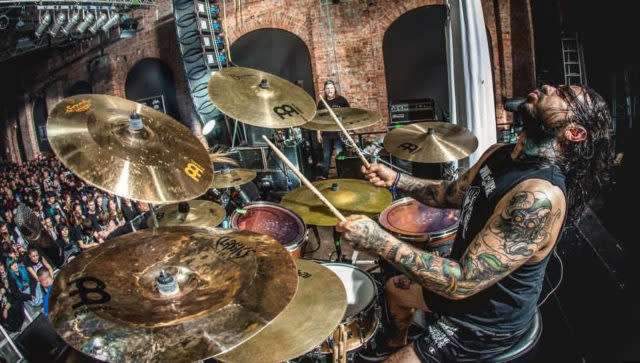
Credit: Maik Kleinert
At the end of my freshman year, White Pony came out, and, I think Napster was still around, and a friend of mine had downloaded it a few days before. He was stoked on it, and I wasn’t yet a Deftones fan. It wasn’t until that record came out that I was thinking, “This album is fucking sick. Holy shit!”
Two days later, the album was coming out, and his mom drove us all to Best Buy to get it. When you bought it back then, it came with a dog tag — I don’t have it anymore — and it came with a CD-ROM game that was like a Pac-Man game. After that, it was just over. I now have a White Pony tattoo on my leg, and I started listening to them religiously. After a while, I found out Abe Cunningham was a big Stewart Copeland fan, so I started listening to the Police more. I could hear what inspired Abe, and it inspired me to listen to more music. That album was the first record where they busted out Frank even more. “℞ Queen” is just a loop beat, you know? There are so many songs on that album that are beat-oriented.
We met Chino in 2010, I think, and he came up to us, and was like, “My son, Jakobe, is a huge Suicide Silence fan. Really cool to meet you guys.” And I was like, “What?” There’s sort of this unwritten rule, at least among some of the bands we’ve toured with: If you are headlining a show, and you’re in between music, between bands, never play Meshuggah or Deftones. If the audience is listening to Meshuggah or Deftones, and they’re getting into it, when you go on, it dilutes the climax of the headliner. You can’t play something that’s hands down more ripping than anything. We’ve gotten mad before on tour. Like, “Who the fuck is playing the Deftones right now? Have them shut it off.” We’ve had to literally tell front of house, please don’t. Put on anything else, just not those two bands.
Daniel Anderson
Guitarist, Idiot Pilot

Credit: Daniel Anderson
Without naming any names, sometimes — as you’re coming up through the industry, just interacting with bands — sometimes you meet people and you think, “Man, I don’t think I can ever listen to your records again.” Deftones are the opposite.
I was trying to quantify why White Pony is such a powerful record, and what it is, I think, is that Deftones started to draw on influences that were a little more shoegaze or almost goth — these genres that were notoriously maybe inward-looking, or coy, but with a confidence and a swagger that I don’t think anyone has ever had. When you actually listen to White Pony, there’s so much darkness that’s kind of associated with staring at the ground and maybe moping around, but the way that Chino delivers his vocals, the guitars, and especially the drumming — there is swagger and confidence to absolutely every part of that record, despite it drawing on these huge, dark, almost like just sad, heavy influences. I think that combination really made it connect with people; instead of having that kind of outcast, “I’m going to pull away” kind of feeling, it has this “I don’t care and this is me” thing that really defines that band. Artistically, they have never felt as though they were ever trying to prove anything. I am really glad to know, 20 years on, that White Pony still holds up. It has really stood the test of time, and even though “Change” was such a huge single, it was only that one — there wasn’t a string of huge hits. In the world of metal, this record is such a big, important deal.
Sam Carter
Vocalist for Architects

Credit: Ed Mason
I was definitely in school when I first heard White Pony, at that age when I was skateboarding to and from school, and when I first heard “Back to School,” it was a touch above anything that I was listening to at that time. It was super cool, but it definitely had elements of other bands I was listening to, and Deftones have been such a constant in my life since then. I can’t really say the same for other bands I was into at that time. I remember seeing the video for that song on MTV2 — it was on all the time. It really is insane to have a career that spans that long and still be that credible and still be that band that everyone’s like, “What would Deftones do?”
The fact that Chino self-records a lot of his stuff is fucking incredible, and the depth to his vocals has always been something that was really inspiring to me. The diversity he has, and also, nobody can make those Chino noises. Like, if you do some sort of crazy loud scream, or almost like a yell, you can’t even get close to those close-mic noises that he does. When you hear him, you know its Chino straight away.
Looking back on it, I can’t help but think how iconic the cover for White Pony is. I don’t even know if they would have realized it at the time, but I have multiple friends, now, that have the white pony tattooed on them. How many bands’ like, front covers still look cool, from that era? You’ve got to remember the kinds of album covers that were around at that time, and the bands they were touring with … they were just so ahead. They still are.
Sheel Davé
Drummer, Bad Rabbits

Credit: Richard Knowles
There was a local radio station in Boston, WAAF, that played bands like Alice in Chains, Aerosmith, AC/DC, but I also grew up listening to Michael Jackson and Prince and so, I was bumping the hip-hop radio stations and then bouncing over to rock stations like WAAF, and I think they played “Bored” off of [1995’s] Adrenaline, and instantly, it was a very cathartic experience. It was one of those moments where, everything I loved, sonically, was finally hitting my ears, and I feel like Deftones in general sort of opened the door at that time for heavy music listeners that may have been afraid to admit that they were secretly listening to Sade. That was the band that made it okay to love Prince but still bump Pantera records.
Not long after, my brother and I went to see them at a local high school gym in Western Massachusetts, St. John’s School in Clinton, and… it was insane. It was Deftones, Limp Bizkit, and Will Haven, and it was, like, the most belligerent show I’ve ever seen. People were crowd-surfing down the rafters; it was complete thuggery. White Pony, that was, hands down, way ahead of its time. It clearly followed absolutely no trend at that time.
It also came out at a time when I was really starting to branch out as a drummer, so, I think the drum composition on that record is so genuine, creative, and effectively simple. Like, on “Digital Bath,” my favorite song … I feel like they were taking risks into new territories. They had already been hinting at super melodic parts on their previous album, but I think that song, in particular, was the pinnacle of that sort of sultry, melodic sound that they made acceptable to put into heavy music. I think metal bands at that time were so afraid to dig deeper into melody, and this album opened the doors for so many other artists. Listening to Abe’s drumming, it proved to me I don’t have to be this flashy drummer to be effective and respected. He made me realize that less is more. I consider him my number one influence as a drummer, and if you listen to my style of drumming, it definitely has parallels to Abe’s. I can’t deny that. He was a massive influence, and I feel like I speak for many musicians when I say that Deftones are the most brutally heavy melodic band that has ever existed.
Tom Rachmann
Vocalist for Penguin on Fire
I was inspired to become a better musician by White Pony without a doubt and even got the pony tattoo on my leg. When Penguin on Fire was first asked to cover a nü-metal song by Imploding Sound Records, we knew as musicians that we had to cover Deftones. Today, Deftones and White Pony have a special place in my heart, and they have both aged like fine wine.
To see our running list of the top 100 greatest guitarists of all time, click here.

